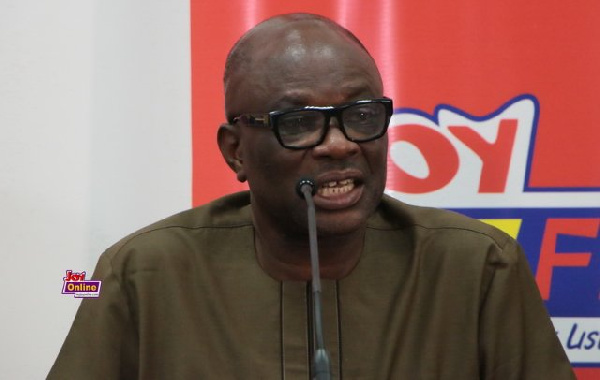The National President of the Ghana Union of Traders Association (GUTA), Dr Joseph Obeng says market traders could find themselves on the bad side of the general public following the Agric Ministry’s direct sale of foodstuffs.
Speaking on Newsfile on Saturday, he stated that traders face numerous challenges and bear huge costs to transport goods to sell and all these are factored into their pricing.
However, the ministry is only subsiding prices which puts them in a favourable spot in the eyes of consumers.
“What they are doing and the narrative that goes with it suggests that they are inciting the public against us, that we are profiteering but that is not the case. Why are they not adding products like tomatoes that will go waste? Because when you buy these goods and it goes waste, you have to also calculate and add them to your account,” Dr Obeng said.
He added that “they (Agric Ministry) will do everything to convince authorities that it can work but you are not adding profit to what you are doing. You have all the logistics to procure the goods at a subsidized rate and then you are trying to compare your pricing with the trader who have challenges?”
According to him, unlike the Ministry, market traders sometimes need four cars to transport their goods and in the case of accidents some of these foodstuffs perish.
“They (Ministry) don't even know the structures of these markets. We have markets that are very cheap and people go from other areas to go and buy from these markets to other areas. They add value (to them) and so all these processes add some costs,” he explained.
Dr Obeng said that traders know they provide a great service to the nation and its citizens and will not engage in profiteering to cause distress.
“A whole ministry competing with market women who do not have the logistics and trying to let Ghana think that traders are taking advantage of them. This is the opportunity that some of us also use to make a living,” the GUTA President said.
His comment comes after the Ministry of Agriculture on Friday began the direct sale of foodstuffs at its premises.
The move, according to the Ministry, is aimed at cushioning Ghanaians and mitigating the impact of rising food prices.
But, Dr Obeng believes that the Agric Ministry’s way of controlling prices is not sustainable; adding that the only way to control price is to add value to the goods.
Meanwhile, the Chairman of the Competitive African Rice Platform, Ghana chapter says it is unfair to blame the market traders solely for the increase in goods.
“Three months ago I was bringing in 50 tonnes of rice by articulator load at GHS14,000, Tamale to Tema, today I am paying GHS60,000 so it has quadrupled and this adds to the cost of the product for the consumer, so if we make it seem as if it is the middlemen and market women who are doing this then we are not being truthful,” Yaw Adu Poku added.
Latest Stories
-
Social media buzzing ahead of Black Sherif’s ‘Zaama Disco’ on December 21
6 minutes -
Afenyo-Markin still suffering from the massive defeat – Fifi Kwetey
13 minutes -
Retain Afenyo-Markin as NPP leader, he has experience – Deputy Speaker
25 minutes -
Kufuor didn’t leave behind a strong economy – Fifi Kwetey
28 minutes -
It won’t be business as usual, remain humble – Fifi Kwetey to party members
1 hour -
Ebenezer Ahumah Djietror appointed as new Clerk to Parliament
2 hours -
Actress Benyiwaa of ‘Efiewura’ TV series dead
3 hours -
Ashanti Regional Chief Imam dies at age 74
3 hours -
Africa Arts Network calls for tax reform to save Ghana’s theatre industry
3 hours -
SSTN Ghana Chapter reaffirms commitment to economic growth under new leadership
3 hours -
Inlaks strengthens leadership team with key appointments to drive growth across sub-Saharan Africa
4 hours -
Green Financing: What Ghana’s Eco-startups need to know
4 hours -
CHAN Qualifiers: Amoah confident of beating Nigeria
4 hours -
Governments deprioritising health spending – WHO
5 hours -
Lordina Foundation brings Christmas joy to orphans
5 hours

